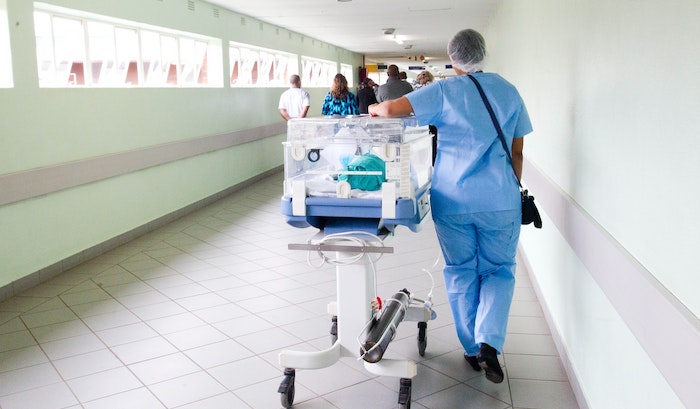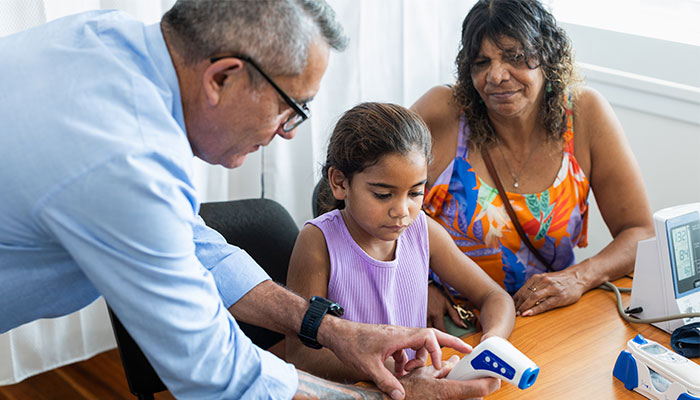More than 84 per cent of Australia’s health consumers have reported they are satisfied with the health services they receive - despite the ongoing pressures of the COVID-19 pandemic, a new survey has found.

Dial it up: 71 per cent of telehealth users said the consultation was as good or better than an in-person appointment.
The Voice of Australian Health Consumers report published this week analyses satisfaction levels and opinions about health services collected from 5100 Australian adults in October 2021 and from 1024 people in December 2018.
Key findings from the survey included that 14 per cent of people with chronic conditions could not afford to pay for all their healthcare or medicine, and 55 per cent of people in rural and remote regions lament a shortage of health workers.
“The survey ‘takes the temperature’ of our health system at a point in time, letting us compare people’s health system experiences before and during the pandemic,” says Professor Jeffrey Braithwaite, who heads up the Australian Institute of Health Innovation at Macquarie University.
His team co-designed the survey with the Consumers Health Forum of Australia, recruiting participants from different states, age groups and genders proportional to the national population, but including larger samples from typically under-represented groups to allow meaningful comparisons.
Positive verdict
The verdict? “Australia has had one of the better-performing health systems in the world for years, and even during the pandemic, consumers reported overwhelmingly positive interactions with it,” says Braithwaite.

Room for improvement: 23 per cent of Australians experienced discrimination or disrespect when receiving healthcare, and this was higher in marginalised groups.
“Our health system is not perfect; there are areas where it falls short and there are people for whom the health service is not adequate – but overall, we have a well-functioning system that successfully delivers millions of services to Australians every year,” he says.
“Australians can be rightly proud that their health system has continued to perform so well during a pandemic,” says Braithwaite, adding that 30 per cent of respondents had increased confidence in the health system since COVID-19 began.
However, with a further 23 per cent of Australians reporting experiencing discrimination or disrespect when receiving healthcare, he says there is still plenty of room for improvement, particularly for people already vulnerable or socio-economically disadvantaged.
Telehealth a winner
More than a third of respondents (37 per cent) had used telehealth – up from 5.5 per cent in 2018. Of these, 71 per cent of telehealth users rated their most recent telehealth appointment as good or better than an in-person consultation.

Taking the temperature: Professor Jeffrey Braithwaite (pictured) says our health system met the needs of more than 84 per cent of consumers surveyed
And of the 823 respondents who used telehealth before March 2020, 535 (65 per cent) said that their most recent telehealth consultation was much better than the previous appointment – suggesting that telehealth improved during the pandemic.
Difficulties with using the technology could potentially account for some of those reporting that the telehealth appointment was worse than in-person, Braithwaite says.
In another discordant and very concerning note, almost a quarter of consumers reported serious psychological distress. However 85 per cent of people with mental distress were satisfied with the digital healthcare they received.
Braithwaite welcomed the Government’s commitment in the Federal Budget to digital health services, including $63.6 million in continued support for digital mental health services. "It is vital that telehealth becomes part of the everyday healthcare available to Australians," he says.
Discrimination, affordability and aged care ring alarm bells
Associate Professor Yvonne Zurynski, also from the Australian Institute of Health Innovation, co-leads this work and said that some of the most significant concerns raised by health consumers were around affordability of healthcare and discrimination or disrespect, while 23 per cent of respondents thought that residential aged care services were bad or very bad.

Equality of Access: Associate Professor Yvonne Zurynski (pictured) says we need to build capacity in the health system to give everyone access to quality care.
“We know that the COVID-19 pandemic introduced a lot of stress into healthcare settings, but these responses show how important it is that we build capacity in the health system for everyone to access safe, quality care,” says Zurynski.
While healthcare affordability overall has improved, with 5.8 per cent of people reporting they couldn’t pay for healthcare or medicine – down from 9.5 per cent in 2018 – it is still a concern for many.
“In both surveys, people with chronic conditions were far more likely to struggle to pay for their medicines or healthcare,” says Braithwaite.
More than 20 per cent of respondents reported disrespect or discrimination, with this more likely in people with chronic conditions, people who identified as Aboriginal or Torres Strait Islander or those who spoke a language other than English at home.
Braithwaite says this survey shows growing acceptance of the important role of consumer feedback on the health system, confirming that across time, Australians are becoming more satisfied with the health system and the care that they receive.
“This shows that we have a ‘learning health system’ – in that general practice, acute care, our hospitals and so on, are all getting better at responding to patients over time.”
He says that this record of health consumer sentiments over time will inform translational research and health policy, to deliver a healthcare system that keeps improving.
Jeffrey Braithwaite is Professor of Health Systems Research and Founding Director, Australian Institute of Health Innovation
Yvonne Zurynski is Associate Professor, Health Systems Sustainability, Australian Institute of Health Innovation



